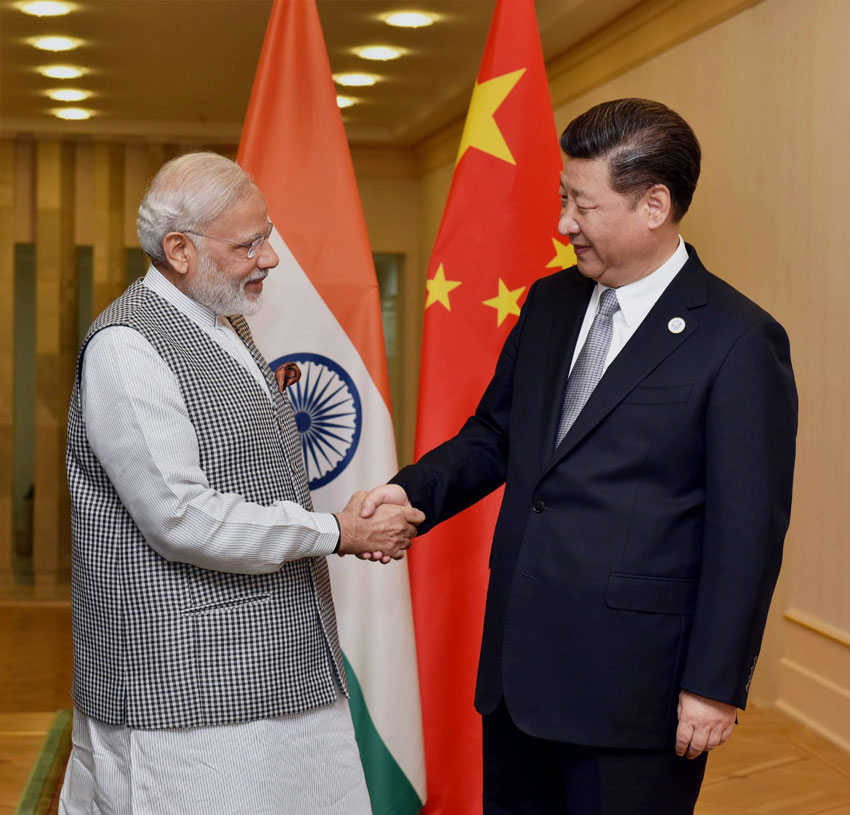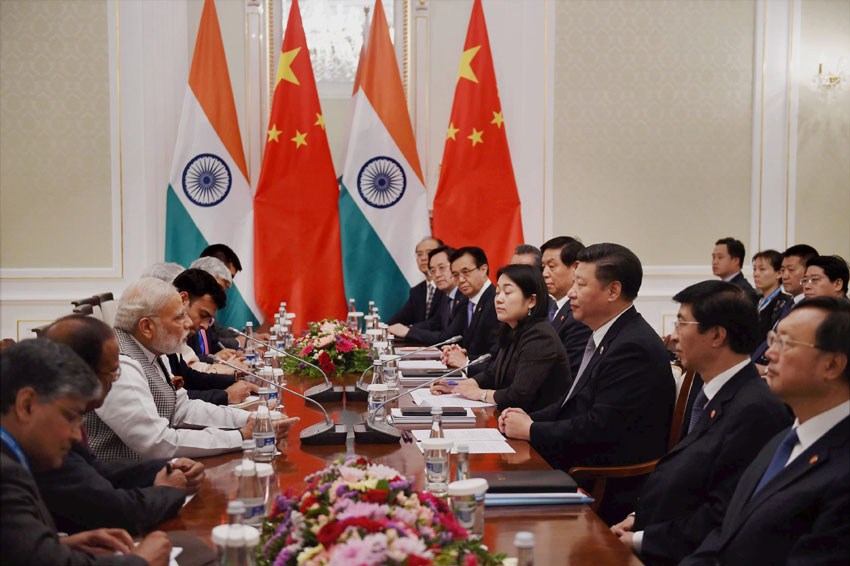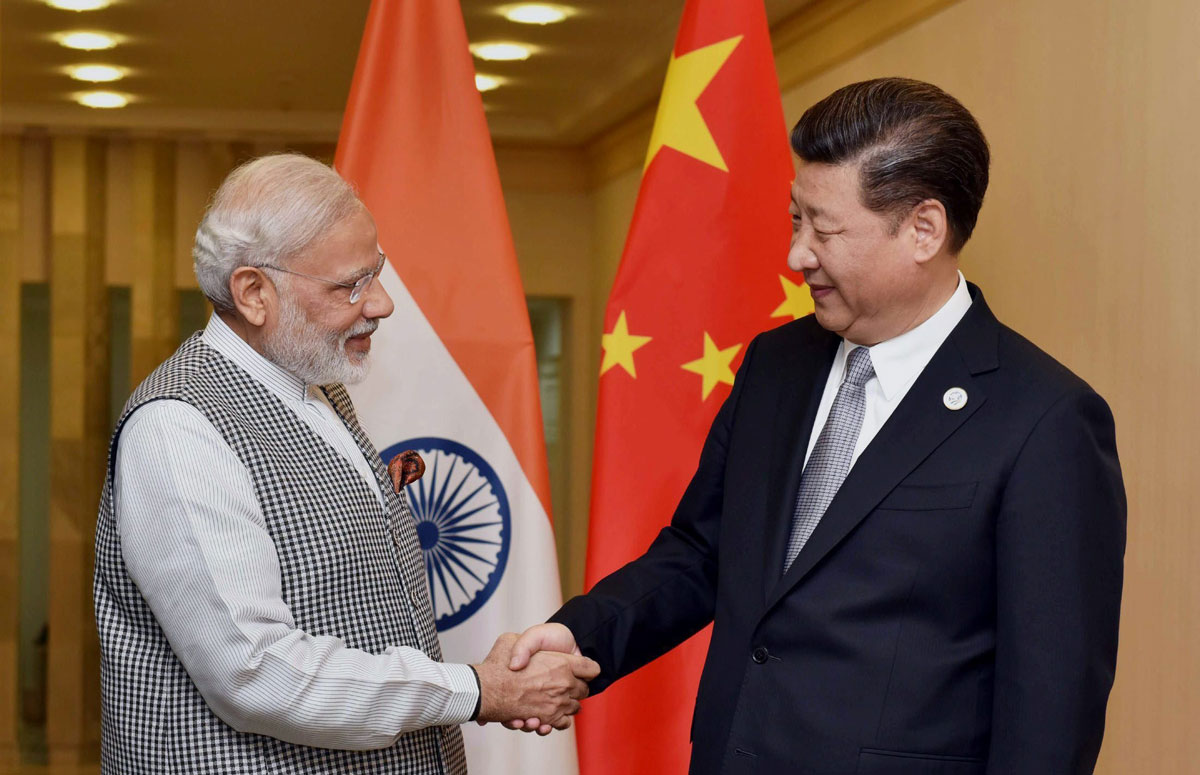MODI MEETS XI, SEEKS SUPPORT ON NSG BID

Seeking China’s support for India’s membership of NSG, Prime Minister Narendra Modi urged Chinese President Xi Jinping, June 23, to make a “fair and objective” assessment of India’s application which is before the plenary of the 48-nation grouping that met in Seoul, writes Manash Pratim Bhuyan. The U.S. said, June 24, that there is “a path forward” for India to become a full member of the Nuclear Suppliers Group by the end of the year, hours after the group’s plenary meeting ended in Seoul with no decision on India’s membership in face of strong China-led opposition, Lalit K. Jha. – #Siliconeer @Siliconeer #IndiaNSGBid #IndoUSRelations #IndoChinaRelations
Meeting on the sidelines of the Shanghai Cooperation Organization (SCO) Summit, Modi said India’s case should be judged on its own merits and China should contribute to an emerging consensus in the Seoul meeting, according to External Affairs Ministry spokesperson Vikas Swarup.
The meeting, which lasted for nearly 50 minutes, comes in the backdrop of stiff Chinese opposition to India’s entry into the Nuclear Suppliers Group (NSG), which looks after critical issues relating to nuclear sector, including trade and export of nuclear technology.
However, when asked about China’s response, Swarup refused to comment, saying, “You know, it is a complex and delicate process. We are waiting (to see) what kind of news comes from Seoul. I will not make any more comment on this.”
Swarup also stated that most of the time of the Modi-Xi meeting was devoted to the NSG issue.
Asked if India talked about the need to delink India and Pakistan’s NSG membership bids, he said, “…You have heard what Prime Minister told Xi Jingping that China must make a fair and objective assessment of India’s application on its own merits and China should join the emerging consensus in Seoul.”

While making some right noises of playing “constructive” role on the issue of memberships of India and Pakistan, China has been unrelenting in its opposition, harping on the need to have a criteria for non-NPT countries like India and clubbing India’s case with that of Pakistan for which it is batting.
Earlier, Pakistan President Mamnoon Hussain met Xi on the sidelines of the summit and thanked China for supporting Pakistan’s case for NSG membership.
Hussain told Xi that any “exception” in granting membership to the NSG will “disturb” strategic stability in South Asia.
“President Xi welcomed India’s accession to the SCO and said it would strengthen it. Prime Minister Modi thanked President Xi for China’s support to India’s membership of the Shanghai Cooperation Organisation,” Swarup said.
Prior to his departure from New Delhi to Tashkent, Modi said India looks forward to fruitful outcome from its engagement at the SCO summit.
India’s entry into SCO as a full member will provide it an opportunity to have extended cooperation with member countries in areas of defense, security and counter-terrorism.
The SCO had set the ball rolling to make India a member of the bloc during its summit in Ufa in July last year when administrative hurdles were cleared to grant membership to India, Pakistan and Iran.
SCO was founded at a summit in Shanghai in 2001 by the Presidents of Russia, China, Kyrgyz Republic, Kazakhstan, Tajikistan and Uzbekistan.
India, Iran and Pakistan were admitted as observers at the 2005 Astana Summit.
Meanwhile, China’s official Xinhua news agency in its report did not make any mention whether Prime Minister Modi or President Xi discussed the issue of India’s NSG bid.
However, it quoted Xi as saying that India and China have much more common interests than differences, and the two sides should enhance pragmatic cooperation in areas such as trade, railway, industrial parks, energy and electricity, information technology, energy conservation and environment protection.
Xi said China is looking forward to enhancing cooperation with India under the framework of the SCO.
He said that China-India strategic partnership is rapidly growing in the direction set by both leaders.
He recalled the important consensus he had reached with President Pranab Mukherjee on bilateral ties when the latter was paying a visit to China last month.
“China will work with India to master the general course for the development of ties,” Xi was quoted as saying by Xinhua.
He also extended his congratulations to Modi over India’s upcoming signing of a memorandum of obligation to join the SCO, a key step for India to obtain membership of the organization.
The Chinese president said China welcomes Prime Minister Modi to attend the G20 Summit in Hangzhou in September. He was also looking forward to visit India in October to attend the BRICS Leaders Meeting.
U.S. DESIRES TO SEE INDIA’S NSG APPLICATION BE CONSIDERED
“We are confident that we have got a path forward by the end of this year,” a top Obama administration official said.
“It needs some work. But we are confident that India would be a full member of the (NSG) regime by the end of the year,” the official told PTI on condition of anonymity.
Refusing to divulge the discussions and opposition to India s membership within the 48-member grouping, the official said details of the internal deliberations are confidential.
But the U.S. strongly believes in India’s membership in the NSG and the Obama Administration has “worked closely” with New Delhi and other countries on this issues, the official said.
Without going into details of deliberations, the official referred to a similar discussion within the Missile Technology Control Regime (MTCR) to which India was inducted early this month after months of discussions within its member countries.
Like NSG, decisions within MTCR is taken with consensus.
“We expected a discussion on the role that India will play and where it has been,” said the official.
“We were able to end discussion this week and we have a clear path forward for India to become a full member by the end of the year,” the official asserted.
“That’s our expectation,” the senior administration official reiterated when asked if U.S. expects that India’s NSG membership could be achieved by the end of this year.
“Our expectations is that this would be finished by the end of this year,” the official said.
The NSG ended its plenary meeting in Seoul with no decision on India’s membership.
China, which had made no secret of its opposition, succeeded in scuttling India’s bid despite a significant majority backing the Indian case. Thirty-eight countries supported India, according to Indian officials.


